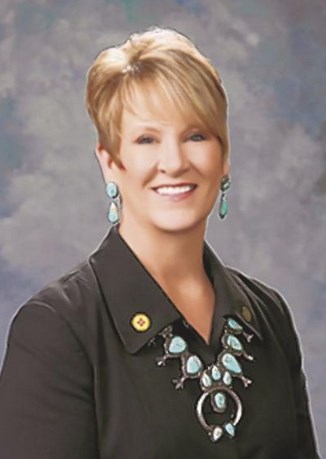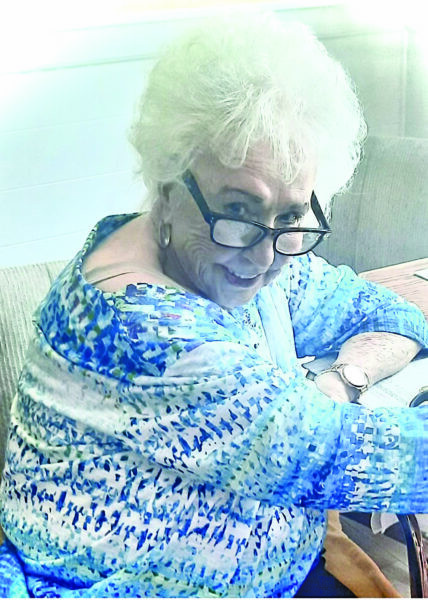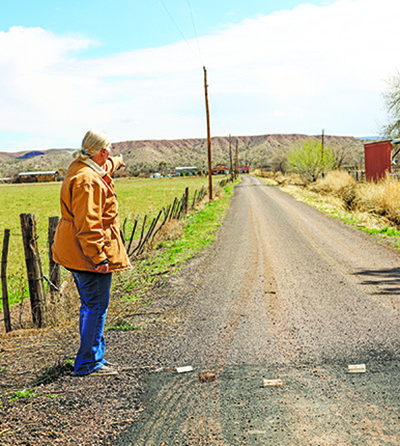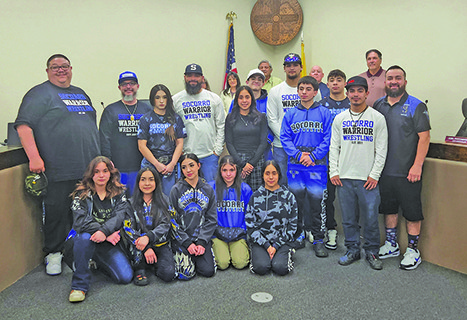
New Mexico State Capitol Building in Santa Fe
Courtesy photo
The 55th New Mexico Legislature is set to convene on January 19 to run through March 20. Two lawmakers representing Socorro County’s interests, 49th District Representative Gail Armstrong and 28th District Senator Siah Correa Hemphill, have already been preparing for an unconventional – prompted by COVID-19 infection concerns – 60-day session.

Senator Siah Correa Hemphill
Even though she was elected in the November general election, Siah Correa Hemphill, 49, a Democrat from Silver City, was appointed ahead of time to the District 28 Senatorial seat – vacated early by Gabe Ramos – on December 29 by Gov. Michelle Lujan Grisham.
In preparing for the 60-day session, Correa Hemphill has been conferencing via Zoom with other lawmakers about what issues to prioritize. She expects the session itself to be a combination of Zoom and in-person. In other words, a hybrid session.
Several lawmakers have said that a mostly remote legislative session was the only way to avoid spreading coronavirus.
“We still aren’t 100 percent sure on how everything’s going to move forward,” she said. “It will probably be mostly virtual, but they didn’t want to make any decision long term since things may change. They’ve asked us to be flexible.”
According to senate leaders, the priority is making sure everybody is going to be safe and accommodating the public in every possible way, although there has been some disagreement in that it will limit public access.
On the other hand, Correa Hemphill believes it opens up the possibility for more people to access through the internet than having to drive all the way to Santa Fe.
“I think this is a way that we could see an increase in public participation in the process, and that is particularly important in Southern New Mexico where people are further from the capitol,” she said.
Once the session gets underway, Correa Hemphill said the top priority is going to be focused on legislation to help our communities recover from the pandemic.
Part of that involves reliable internet access.
“Clearly, high-speed broadband internet access is fundamental not only to our educational system but also to helping our businesses recover, including rural entrepreneurial enterprises as well as agriculture,” she said.
Particular pieces of legislation Correa Hemphill plans on being part of is mental health care.
“Because of this virtual world that we’re all living in. our kids are living in, we’re going to be dealing with mental health effects from that,” she said. “There’s legislation called Anna, Age Eight that’s important to me. The program is focused on ensuring that all people, especially in rural communities, can access five basic services that are needed for survival. Access to healthcare, mental healthcare, food security, transportation, and affordable housing. If those are met people are able to thrive and communities are able to prosper. There’s some work done in Catron and Socorro counties already.”
“There are big disparities in education and health care access and economy,” she said.
She wants to see more investment in public education, job training, mental health services, evidence-based drug treatment programs, and end the school-to-prison pipeline.
Another piece of legislation she is interested in is the New Mexico Health Security Act, which would give all New Mexicans the same health coverage that state workers currently have.
“There’s a misconception about it being socialized medicine,” she said. “It would be paid for by premiums based on income, and you would still have the ability to choose your own doctor. Not doctors paid by the state government. I’m hoping that it will be seen as less controversial if people have a better understanding of what it is.”
The Physical Therapy Compact Bill is also on her watchlist.
“What it does is allow New Mexico to cooperate with bordering states that are part of this compact,” she said. “So, if a physical therapist lives in Arizona, which is part of the compact, we are able to hire that physical therapist who is licensed in Arizona without having to go through our licensure process here. That would be very beneficial, as New Mexico has a shortage of physical therapists.
“I plan to bridge the divide between parties,” she said. “So much of ‘us versus them’ goes on.”
Along with pandemic-related measures, other issues expected to be debated include legalizing recreational cannabis for adults, repealing a long-dormant state abortion ban, and the state’s emergency powers laws.

Rep. Gail Armstrong
Courtesy photo
On the House side, Rep. Gail Armstrong, Republican from Magdalena, who was re-elected to another two-tern in November, has been attending meetings remotely but much prefers doing it face-to-face.
“It’s so hard to be able to get all the information that they’re sending that I like to touch, and feel, and highlight,” she said. “But From what I’ve been hearing is that it’s all going to be hybrid. All of our meetings will be hybrid.”
In light of that, Armstrong said for this session, instead of renting something temporary in Santa Fe, she will be traveling back and forth between the capital and Magdalena.
Armstrong will be pushing for a handful of bills once the session begins.
One bill Armstrong is backing will allow New Mexico to certify its own meat inspectors, USDA approved. At one time the New Mexico Livestock Board had its own certified meat inspectors, but because inspectors were properly trained and it wasn’t funded, so the state canceled it.
“We need to bring that back,” Armstrong said. “A return to having state meat inspectors that could classify meat USDA-certified would mean increased business for the numerous local meatpacking houses across the state. They’re asking for $1.8 million to re-open New Mexico meat inspectors.”
She feels it would open up a lot of doors for New Mexicans to not rely on out-of-state processors, “and it could allow a meat processor to open in Socorro.
“In New Mexico, we only have two USDA meat inspectors, and with this, we think it would help encourage economic viability for New Mexico if we had our own meat inspecting to be done. We pre-filed the bill.”
Armstrong and Rebecca Dow (R-Truth or Consequences) are carrying the bill, she said, “along with several other people. A lot of people have worked really hard on this bill.”
Another priority for Armstrong is a bill allowing Nurse Practitioners in rural areas to dispense non-narcotic prescription medications, such as a penicillin prescription, directly to a patient.
“This is a bill I’ve tried to get passed for the last two years,” she said. “As it stands now, rural New Mexico Nurse Practitioners cannot dispense a medication unless it is pre-packaged in a bubble. So instead of counting say, 12 penicillin pills out of a bottle, the patient has to go to a pharmacy for something like a bubble pack of 12.
“We’ve got good support behind it,” Armstrong said. “It’ makes sense for rural New Mexicans. So they won’t have to go all the way to a pharmacy. I’m pushing that one really hard. ”
Another bill Armstrong is supporting would improve reciprocity with other states with counselors and make it easier for them to become licensed in New Mexico.
“Our reciprocity doesn’t line up with other states when it comes to counselors coming from out-of-state to get their license here in New Mexico,” she said. “We’re in a crisis right now, and especially with children and suicide. There are counselors who can not get their license that have 10 years’ experience, or more.”
She says the hangup lies in the licensing procedure which starts with an application form.
“They would apply through the licensing board, but then if they don’t check all the boxes, they can’t even get heard in front of the board. So I’m trying to make it to where the board will hear them,” Armstrong said. “We’re doing a high-level view. At the high-level view, an applicant would be able to make an appointment to be seen in front of the licensing board – instead of just someone looking at a paper saying they don’t qualify – to let them talk about why they would be valuable to New Mexico, their education, and anything else.”
Streamlining the process would not make it any less stringent, she said.
“We need the best. Right now, for instance, there’s a couple who moved from Colorado that lives in Las Cruces and can not get a license,” Armstrong said. “And they specialize in children’s suicide. And we need them, more than ever right now. So it’s just trying to let the regulation and licensing board of that commission know that just because they didn’t check every single box they should still get a hearing and be able to talk about possibly giving them a license.
“We put roadblocks up in New Mexico in several different entities that cause people to not want to come here, and/or cause them to leave,” she said.
Armstrong also talked about seeing the need to re-open schools and businesses. She said she supports the efforts of House members Daymon Eli (D-Albuquerque) and Greg Nibert (R-Roswell), who want lawmakers to have a say in the state’s emergency response laws and mandates.
“The legislature as a whole would like to be involved in making some of those decisions,” Armstrong said. “Or letting the county officials be involved as well to say, ‘No, we’re good in our county.’ That’s how they’re doing it in Colorado. Every county is held accountable for re-opening its businesses.”
A five-bill limit for each member of the state House of Representatives has been suggested by its leadership.


















